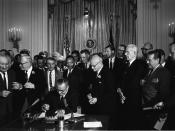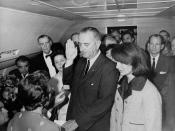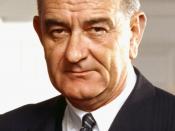Most presidents within the 21st century have had programs with short names; Theodore Roosevelt had his Square Deal, Woodrow Wilson had his New Freedom, Franklin Roosevelt had his New Deal, and in the midst of several hundred graduates at the University of Michigan, Lyndon Johnson proposed the idea of the Great Society. After Kennedy's death, a loosely drafted plan in domestic affairs was dropped in Lyndon's lap. This loose sketch became a plan to bring a country out of low morale, lift the brethren, end poverty, and stop to racial injustices. Lyndon's plan was to build up the country and let it be like the city on the hill. Johnson said at the beginning of his presidency, "Let this session of Congress be known as the session which did more for civil rights that the last hundred sessions combined." He continued saying that he wanted "the most far-reaching war on human poverty and unemployment."
He also stated that he wanted "a major health program, and a reform of transportation policies, and the most effective, efficient foreign aid program ever, and the construction of more homes, schools, libraries, and hospitals than any single session of Congress in the history of our Republic" (Miller 356). Partnered with Congress, Lyndon carried the original ideas of Kennedy, intertwined with the domestic ideas of his own and carried The Great Society further than any one expected. This blueprint for a unified, prosperous America not only excited the public due to its intrepid sweep, but because most ideas of The Great Society became law. However, whenever the '60s are mentioned, unsettling ideas of racial injustice, nuclear proliferation, Russia, and the "red scare" all come to mind. As Doris Kearns states on page 332 of her book Lyndon Johnson and the American Dream, "The Heroes of...


